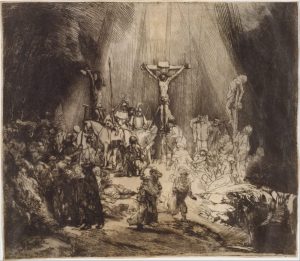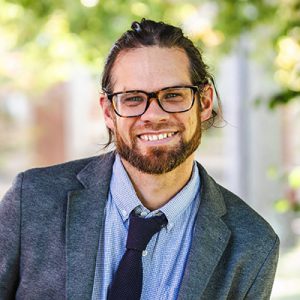Trying to pray as, for, or with someone in the grips of uncertainty or lack of faith is a little like a modern poet’s trying to compose a new piece in the “genteel lyricism” of the 19th-century masters. Joy Ladin has written about how much of modern poetic expression is a skeptical reaction to the tendency of earlier poets to speak in universalizing terms about our world with a perspective “from above,” as it were.
The counter-reaction has produced what Allen Ginsburg called “the aesthetics of relative truth,” whereby poets express “from below” individual perspectives, voices, and biographical anecdotes, while leaving unanswered—or even ridiculing—the larger question of truth. Entering the genre of prayer, especially as enshrined in our liturgies and collective Christian praxis, can ask skeptics to speak suddenly with a feigned surety, or at least with a voice that to their minds ignores deep doubts and uncertainties. How do we pray to God when it is in fact God, God’s character, or God’s involvement in the world that is the very thing in question?
How do we pray to God when it is in fact God, God’s character, or God’s involvement in the world that is the very thing in question?
Hearing the Heart
 We need to recognize at the outset that that question can stem from different places in the mind and heart. For some people, fleeting waves or prolonged states of doubt and uncertainty are primarily intellectual in nature and stem from encountering challenging perspectives in the classroom, in various forms of media, or in other persons. Such is common on college campuses today, as religious students increasingly find themselves ill equipped to respond to new viewpoints they perceive as contrary to their faith. At the other end of the spectrum, uncertainty and doubt may arise as one responds to difficult life experiences—especially suffering, tragedy, and disappointment—that force a person to rethink his or her cherished theological convictions.
We need to recognize at the outset that that question can stem from different places in the mind and heart. For some people, fleeting waves or prolonged states of doubt and uncertainty are primarily intellectual in nature and stem from encountering challenging perspectives in the classroom, in various forms of media, or in other persons. Such is common on college campuses today, as religious students increasingly find themselves ill equipped to respond to new viewpoints they perceive as contrary to their faith. At the other end of the spectrum, uncertainty and doubt may arise as one responds to difficult life experiences—especially suffering, tragedy, and disappointment—that force a person to rethink his or her cherished theological convictions.
We need to recognize at the outset that question[s] can stem from different places in the mind and heart . . . . Our presence and our prayers should embody the truth that there is space in our tent to name difficulties honestly, and there is a language of lament to voice them.
In both the intellectual and the experiential—and all cases in between—it is important to remember that the words we choose to speak will not always be understood in the way we intend. So even when our prayers and words of advice are theologically sound and intellectually rich, and even when our encouragement stems from genuine good will, our words can still communicate an underlying impatience with another’s doubt and questioning. They may communicate, unhelpfully, our real hope that the difficulty will soon “end” and “things can get back to normal.” I know from experience on the receiving end of such pastoral counsel that it is far more helpful—and surely more difficult—to begin with a ministry of presence and to practice a posture of listening. Our presence and our prayers should embody the truth that there is space in our tent to name difficulties honestly, and there is a language of lament to voice them.
Even when our prayers … are theologically sound and intellectually rich, and even when our encouragement stems from genuine good will, our words can still communicate an underlying impatience with another’s doubt and questioning … our real hope that the difficulty will soon “end” and “things can get back to normal.”
Crying Out to God—Jesus and the Psalms
Jesus himself embodied this truth in his last moments on the cross, and it may be particularly helpful to reflect on this episode and allow it to permeate our prayers. At the very climax of Jesus’ earthly ministry, when he is doing precisely what he had set out to do, we observe in the cry of dereliction (“My God! My God! Why have you forsaken me?”) a profound encounter with doubt, uncertainty, and a sense of failure. Yet the cry of dereliction also shows that Jesus dealt with those realities at this harrowing moment by naming them and voicing them—with utter honesty—to God.
Prayer at this moment is hardly a setting aside of intellectual and existential struggles . . . it is, rather, expressing that very struggle to God.

Indeed, there is a paradox here that should also characterize our prayers. Prayer at this moment is hardly a setting aside of intellectual and existential struggles to assume a confident and assertive voice “from above” that is alien to us. It is, rather, expressing that very struggle to God, just as Jesus does on the cross. Importantly, however, the expression of that struggle is directed toward God in words of desperation, as Jesus cites an opening line of a Psalm of David: “My God, my God, why have you forsaken me? Why are you so far from helping me, from the words of my groaning?” (Ps 22:1). There is, therefore, both here and in the Psalms of Lament (also a helpful resource) in general, a whole genre of speech that invites us to ask, to question, to challenge, and to give ourselves to God in the process.
Book of Psalms
Psalms of Individual Lament: 3, 4, 5, 7, 9-10, 13, 14, 17, 22, 25, 26, (27), 28, 31, (36), 39, 40:12-17, 41, 42-43, (52), 53, 54, 55, 56, 57, 59, 61, 64, 70, 71, 77, 86, (89), 120, 139, 141, 142
Psalms of Community Lament: 12, 44, 58, 60, 74, 79, 80, 83, 85, (89), 90, 94, 123, 126, 129
Faith vs. Certainty
 It can also be helpful to remind those struggling particularly with intellectual doubts and uncertainties that the modern understanding of “faith” has been essentially to reduce it to “belief.” The upshot is that, especially in a Protestant context, temporary or prolonged doubt can create tremendous anxiety. In the Bible, however—both Old and New Testaments—“faith” is much better understood as a disposition of trust in God that manifests in how we live. It may be helpful here to recall in our prayers biblical scenes that define “faith” better than our contemporary culture is wont to do. One such scene appears at the beginning of Jesus’ ministry when he calls four brothers to follow him. He does not give them a theology lesson first and ask them to sign on; he rather utters a call and invites them to take the risk of launching out to follow him. This following is what Jesus asks of us, too: he utters a call and invites us to respond in “faith”—trust manifested in life. “Faith” is not having utter certainty about the things of God, nor is it knowing all the answers to life’s difficult questions. Faith does not begin with understanding; rather, it “seeks understanding,” as St. Anselm so wisely put it. Our prayers can be acts of seeking understanding.
It can also be helpful to remind those struggling particularly with intellectual doubts and uncertainties that the modern understanding of “faith” has been essentially to reduce it to “belief.” The upshot is that, especially in a Protestant context, temporary or prolonged doubt can create tremendous anxiety. In the Bible, however—both Old and New Testaments—“faith” is much better understood as a disposition of trust in God that manifests in how we live. It may be helpful here to recall in our prayers biblical scenes that define “faith” better than our contemporary culture is wont to do. One such scene appears at the beginning of Jesus’ ministry when he calls four brothers to follow him. He does not give them a theology lesson first and ask them to sign on; he rather utters a call and invites them to take the risk of launching out to follow him. This following is what Jesus asks of us, too: he utters a call and invites us to respond in “faith”—trust manifested in life. “Faith” is not having utter certainty about the things of God, nor is it knowing all the answers to life’s difficult questions. Faith does not begin with understanding; rather, it “seeks understanding,” as St. Anselm so wisely put it. Our prayers can be acts of seeking understanding.
“Faith” is not having utter certainty about the things of God, nor is it knowing all the answers to life’s difficult questions.
Love Beyond Words
 One final confession: I am sometimes tempted to frame my prayers as little apologetics lessons or theodicies. But then I recall the example of Christ in Dostoevsky’s Grand Inquisitor. How does he respond to the questioning of the priest who asserts—and sometimes with brilliant argumentation—that Christ was wrong to refuse the devil’s three temptations in the desert? We assume that Jesus has his superior reasons. But offering them is not what he does here. His response is far more mysterious and frankly more profound: he merely kisses the priest. The gesture points to a disarming love beyond words. It is an embodied prayer. Here the fruits of the Spirit—particularly peace and patience—are near to hand. Can we strive to make our prayers with and for others, especially those struggling with uncertainty and doubts about their faith, a kiss of that nature?
One final confession: I am sometimes tempted to frame my prayers as little apologetics lessons or theodicies. But then I recall the example of Christ in Dostoevsky’s Grand Inquisitor. How does he respond to the questioning of the priest who asserts—and sometimes with brilliant argumentation—that Christ was wrong to refuse the devil’s three temptations in the desert? We assume that Jesus has his superior reasons. But offering them is not what he does here. His response is far more mysterious and frankly more profound: he merely kisses the priest. The gesture points to a disarming love beyond words. It is an embodied prayer. Here the fruits of the Spirit—particularly peace and patience—are near to hand. Can we strive to make our prayers with and for others, especially those struggling with uncertainty and doubts about their faith, a kiss of that nature?
Those who would like to probe further here may benefit from reading: Blaise Pascal, Pensées; Mother Teresa, Everything Starts from Prayer; and Eugene Peterson, Answering God: The Psalms as Tools for Prayer.
In the meantime, consider sharing this prayer with someone who is struggling with doubt and uncertainty about faith:
Lord, we do not know what to pray, and we do not know what to make of you. We are like Jacob on the banks of the Jabbok, on the border of the promised land, looking in from the outside. But like Jacob in that pivotal moment, we will never stop wrestling with you. We cry out to you now from the place of our estrangement. Bring us home, we pray. Amen.
 Dr. Tucker Ferda is associate professor of New Testament at Pittsburgh Theological Seminary. He has expertise in a wide range of areas in biblical studies, including the gospels, the life of Jesus, the Old Testament in the New, the history of biblical interpretation, Hellenistic Jewish literature, the Dead Sea Scrolls, and the theological interpretation of Scripture. Dr. Ferda is the author of Jesus, the Gospels, and the Galilean Crisis (Bloomsbury T&T Clark, 2019) and Jesus and His Promised Second Coming: Jewish Eschatology and Christian Origins (Eerdmans, 2024). He is a frequent presenter at regional and national SBL meetings, and he has published numerous essays and peer-reviewed articles in journals such as Journal of Biblical Literature, Journal of Theological Studies, New Testament Studies, and Journal for the Study of Judaism. Dr. Ferda holds degrees from Bethel University (B.A.), Duke University (M.T.S.), and the University of Pittsburgh (Ph.D.). He is a member at Eastminster Presbyterian Church (Pittsburgh, Pa.), and he often leads studies in area churches.
Dr. Tucker Ferda is associate professor of New Testament at Pittsburgh Theological Seminary. He has expertise in a wide range of areas in biblical studies, including the gospels, the life of Jesus, the Old Testament in the New, the history of biblical interpretation, Hellenistic Jewish literature, the Dead Sea Scrolls, and the theological interpretation of Scripture. Dr. Ferda is the author of Jesus, the Gospels, and the Galilean Crisis (Bloomsbury T&T Clark, 2019) and Jesus and His Promised Second Coming: Jewish Eschatology and Christian Origins (Eerdmans, 2024). He is a frequent presenter at regional and national SBL meetings, and he has published numerous essays and peer-reviewed articles in journals such as Journal of Biblical Literature, Journal of Theological Studies, New Testament Studies, and Journal for the Study of Judaism. Dr. Ferda holds degrees from Bethel University (B.A.), Duke University (M.T.S.), and the University of Pittsburgh (Ph.D.). He is a member at Eastminster Presbyterian Church (Pittsburgh, Pa.), and he often leads studies in area churches.
Read Next



